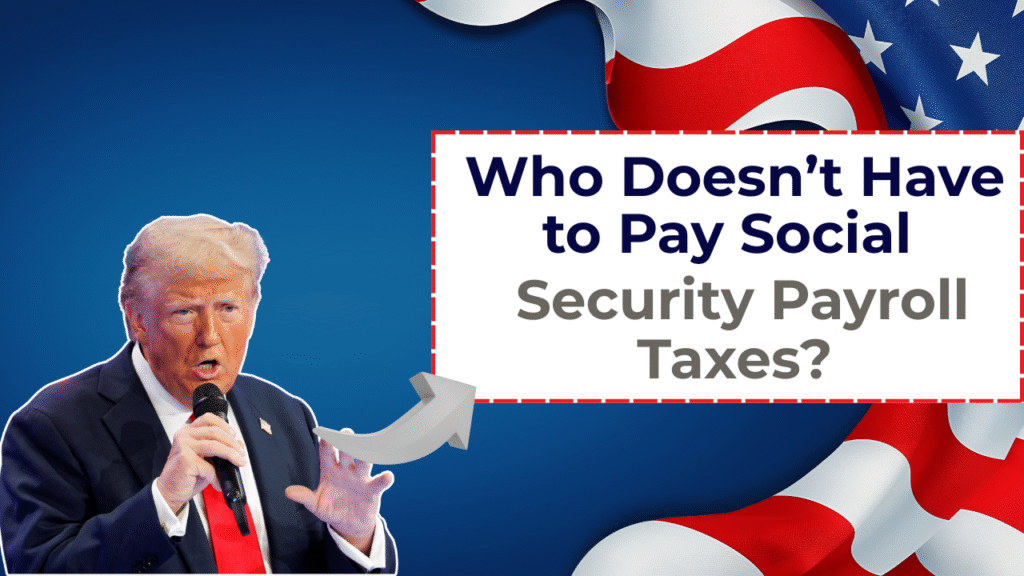The Social Security payroll tax is a critical component of the United States’ retirement system, funding benefits for millions of retirees, disabled individuals, and surviving family members. Most U.S. workers see 6.2% of their wages deducted for Social Security, matched by their employer for a total of 12.4%. But not everyone contributes to this system.
While most employees must pay the Social Security tax, several categories of workers are legally exempt. Understanding who qualifies for these exemptions can help clarify how the system works and who it’s designed to support.
What Is the Social Security Payroll Tax?
The Social Security tax is part of the Federal Insurance Contributions Act (FICA), which also includes the Medicare tax. Together, FICA taxes support the retirement, disability, survivorship, and medical coverage provided under Social Security and Medicare.
The Social Security portion of FICA is 6.2% of wages for employees (up to an annual income cap), and employers pay an additional 6.2%. Self-employed individuals pay the full 12.4% themselves through the Self-Employment Contributions Act (SECA).
Workers Who Are Exempt From Social Security Payroll Taxes
1. Certain Government Employees
Some government workers, particularly at the state and local levels, do not pay Social Security taxes. Instead, they may be covered under alternative retirement systems, such as state-run pension plans. This exemption primarily affects:
- Certain state and municipal employees whose jobs are covered by a public retirement system approved by the government.
- Federal employees hired before 1984 who are covered under the Civil Service Retirement System (CSRS).
These workers generally do not pay into Social Security but may receive benefits through their alternate retirement systems. However, if they also worked jobs covered by Social Security, their eventual benefit may be reduced under the Windfall Elimination Provision (WEP).
2. Some Nonresident Aliens
Nonresident aliens working in the U.S. under certain visa types may be exempt from paying Social Security and Medicare taxes. This includes:
- Individuals in F-1, J-1, M-1, or Q-1 visa status who are temporarily in the U.S. as students, teachers, or cultural exchange visitors.
- Foreign government employees working in official capacities.
- Employees of international organizations such as the United Nations or World Bank, provided they are not U.S. citizens or permanent residents.
These exemptions are often temporary and apply only during the visa holder’s nonresident status.
3. Members of Certain Religious Groups
Some religious groups oppose public insurance, including Social Security, on doctrinal grounds. The law allows members of these groups to file for an exemption if the group:
- Has a long-standing religious tradition opposing insurance benefits.
- Provides a reasonable level of self-sufficiency and support for members in old age, disability, or death.
For example, the Amish and certain Mennonite communities often qualify for this exemption. To opt out, individuals must file IRS Form 4029 and meet specific criteria. Importantly, this exemption is rare and not easily reversed once accepted.
4. Students Working for Their Schools
Full-time students who work for the educational institution they attend may be exempt from paying Social Security taxes on those wages. This is known as the “student FICA exemption.”
To qualify:
- The student must be enrolled at least half-time.
- The job must be part of the school’s regular operations (like working in the campus library or cafeteria).
- The relationship must be primarily educational in nature.
This exemption does not apply to student employees during school breaks or those who work full-time.
5. Self-Employed Workers With Very Low Income
Self-employed individuals are required to pay self-employment tax (which includes Social Security and Medicare taxes) if their net earnings are $400 or more in a year. Those earning less than this threshold are exempt from SECA taxes for that year.
However, this also means they will not earn Social Security credits for that income potentially affecting future eligibility for retirement benefits.
6. Certain Foreign Students and Exchange Visitors
In addition to nonresident aliens mentioned earlier, specific international students, scholars, and researchers temporarily in the U.S. may also be exempt if their work relates to their visa purpose and stays within legal duration limits.
This exemption may extend to those on OPT (Optional Practical Training) or CPT (Curricular Practical Training), provided they remain in valid visa status and meet IRS criteria.
Should You Opt Out If Eligible?
While exemptions from Social Security taxes may seem financially beneficial in the short term, they come with trade-offs. Most importantly, exempt individuals do not earn work credits toward Social Security retirement or disability benefits.
This could leave individuals without a safety net later in life unless they have access to a strong pension or alternate form of retirement support.
For those covered by state or religious systems, these programs often have their own rules for benefit eligibility and payouts. Before seeking an exemption, it’s wise to consult with a tax advisor or financial planner to fully understand the implications.
Final Thoughts
Social Security is a foundational part of the American retirement system, but not all workers are required to contribute. From government employees with alternative pensions to religious objectors and certain foreign workers, exemptions are narrowly defined and come with specific conditions.
Understanding who is exempt—and why sheds light on how the system balances inclusivity with flexibility. Still, for most workers, paying into Social Security is not just a requirement it’s a pathway to financial stability in later life.




